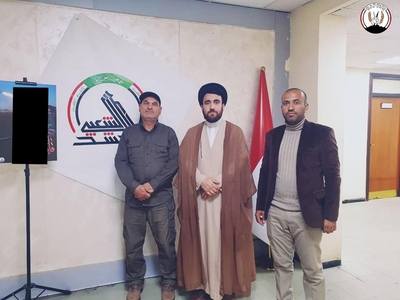Forces affiliated with the Hashd Sha'abi Commission have an important presence in the Sinjar area in northwest Iraq on the border with Syria. One of those groups is the 'Sinjar Force.' Previously on this blog I provided a translation of an interview conducted by al-Fallujah TV with Sayyid Mahmoud al-Araji (Arabic spelling: السيد محمود الأعرجي), who is the commander of the Sinjar Force. Yesterday I got the opportunity to interview al-Araji myself about the Sinjar Force and the current situation in Sinjar. The interview is slightly edited and condensed for clarity. Any parenthetical insertions in square brackets are my own.
 Sayyid Mahmoud al-Araji (centre). |
Q: When was the Sinjar Force formed and what was the reason for the formation? Is it affiliated with the al-Abbas Combat Division? Are all its members from the Sinjar district?
A: This force was formed in 2017 during the liberation of the south of Sinjar. At the time it was formed officially, but the nucleus was present within the members of other formations, but as a formation during the operations to liberate south Sinjar this force was formed. Of course the reason for the formation is to participate in the preservation of the security of the area and it is necessary for us to be from the sons of the area as the area is brittle in terms of security. So the formation of any military force is within the mechanisms and within the security institution in the Iraqi state. With regards to the al-Abbas Combat Division, yes, this force was with direct support from the al-Abbas Combat Division, but currently the force is in the form of a regiment affiliated with the Ninawa Area Operations Command [of the Hashd]. As for our relation with the Division, it is a relation of support in some of the logistical matters and some of the matters of support. This is the extent of our relations with the Division.
Q: In which operations has the force participated and what is the number of martyrs?
A: With regards to the operations the force has participated in, I have told you of the operations in which it participated in the south of Sinjar. The number of martyrs: until now we do not have martyrs.
Q: What are the responsibilities of the force currently? And what are the most important accomplishments of the force outside the military framework?
A: Responsibilities of the force currently: they are participation in preserving the security in Sinjar and the peripheries of Sinjar. Accomplishments of the force: they are participation in return of the IDPs and offering aid of food baskets, all the humanitarian aid that this force has undertaken. And this is well-known among us and you can look into this issue and it is all documented in a great sense, of course in cooperation with the holy Atabat [shrines] and the charitable convoys and the humanitarian NGOs. The force has participated in a great sense in facilitating the return of the IDPs and offering them all that is possible from in-kind and material assistance and even assistance in spiritual matters.
Q: How do you assess the current situation in Sinjar? To what extent has there been the implementation of the agreement between Baghdad and Arbil regarding the Sinjar district? What are the most important challenges and problems currently?
A: The current situation in Sinjar: very good currently in comparison with the conflicts and fierce struggle for this town. The situation is very good. I see that for it is well known that even the criminality aspect in Sinjar is very little: for every three or four months or even year we have a criminality case and there may be none or only one or two cases. So the situation is very good in terms of the security angle. Regarding the agreement between Baghdad and Arbil: the first stage has been implemented. The security forces that are inside Sinjar- the centre of Sinjar district and the centre of Sinun sub-district and Khanasor- all of them are outside the borders of the towns: by this I am speaking to you about us as official forces that are represented in the Hashd Sha'abi, these Hashd groups are present in the area of the Yezidi Hashd and the tribal Hashd, and also our Hashd. And even part of the Hashd that was the YBŞ [Sinjar Resistance Units], they have officially come by agreement with the government in Baghdad into the framework of the law and they are currently Regiment 80 within the tribal Hashd, and all of them are under the authority of the state. The forces present currently are embodied in the Iraqi army, the federal police, the local Hashd Sha'abi and the formations of the Interior Ministry like the local police etc.
Of course the issue of Sinjar is important you know there are regional balances in the situation of Sinjar. I will give you my personal opinion on the Sinjar agreement. All the people of Sinjar have recognised and also all those who made the agreement, even Baghdad on one side and Arbil on the other: they acknowledge that there is no presence for the true representation of the people of Sinjar in this agreement, especially in an agreement of this extent, it is right that there should be representation for the people of Sinjar concerning the fate of our sons and our generation and descendants in this area . As Yezidis, Arabs, Kurds, Muslims and Christians: we did not have any representation in this agreement. The current challenges are foreign interventions with regional interventions with great regret, and likewise they are foreign problems. We do not have problems between the sons of Sinjar, but currently the politics with political interventions are currently impacting the situation in Sinjar and the affairs of Sinjar.

